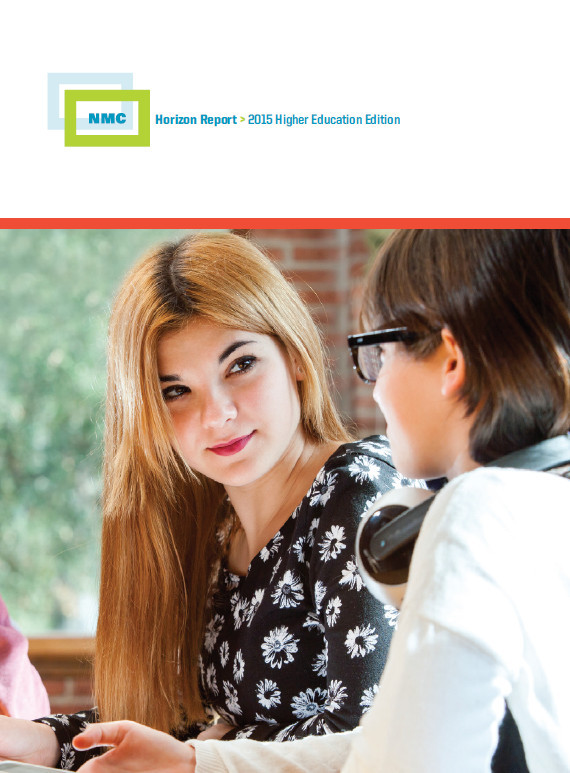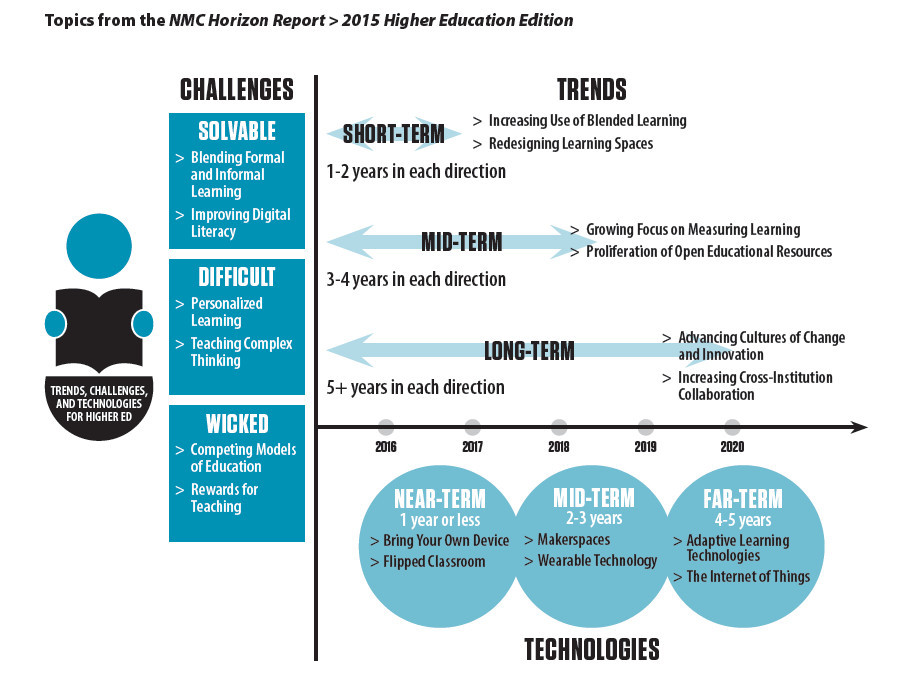The Oracles of Ed. Tech Have Spoken: The 2015 Horizon Report is Now On-line
For those of us who eat, breathe and sleep Education Technology, the annual publication of the NMC Horizon Report for Higher Education gives us that same giddy feeling we used to get when we got a first glimpse of prettily papered presents in the month of December.
Part mirror, part crystal ball, each Horizon Report holds up a looking glass on the world to reflect on current trends accelerating technology adoption in Higher Education, challenges impeding this adoption and other important developments in Educational Technology. And like a mystic fortune-teller, the international panel of experts gazes into its cloudy orb to divine the technologies that will be integrated in the short, medium and long term. Their process is a lot more scientific though, and uses a wiki to organize the work and gather evidence that serves as input for the report.

The cover of the 2015 NMC Horizon Report for Higher Education
The Horizon Report is a product of a collaboration between the NMC (formerly New Media Consortium) and EDUCAUSE. According to its web site, the NMC “is an international community of experts in Educational Technology — from the practitioners who work with new technologies on campuses every day; to the visionaries who are shaping the future of learning at think tanks, labs, and research centers; to its staff and board of directors; to the advisory boards and others helping the NMC conduct cutting edge research.”
This year, with themes like Bring-Your-Own-Device, the Flipped Classroom, Maker Spaces, Wearable Tech, Adaptive Learning, and the Internet of Things, it is evident that the Quebec College Network is at the forefront of Ed Tech with our peers.

An infographic summarizing the HR2015 findings Johnson, L., Adams Becker, S., Estrada, V., and Freeman, A. (2015). NMC Horizon Report: 2015 Higher Education Edition. Austin, Texas: The New Media Consortium.
A Conversation With the Horizon Report’s Canadian Panelists
The panel of experts who contributed to this year’s report includes two Canadians, Vivian Forssman of Royal Roads University, and Lisa Koster of Conestoga College. I recently had the pleasure of interviewing Ms. Forssman and Ms. Koster leading up to the launch of the Horizon Report. I asked them if they had a sense of how far along Canada is with regards to the emerging trends in the Horizon Report.
From her perspective, having worked at various Higher Education establishments in Western Canada, Ms. Forssman feels that the redesign of learning spaces is very evident with a wide array of capital improvement projects being approved to transform the classroom. She has also witnessed the adoption of blended learning at several universities across Canada and shared that one of the keys to encouraging this move is to adequately support the production of learning. At Royal Roads, they have created a space called The Studio to assist the transition to blended delivery, where Teachers can drop-in and receive information and training on a just-in-time basis. Ms. Forssman points out that one of the current limitations in the move toward blended learning is that educational establishments need to encourage Adjuncts to take risks with their teaching. Currently, bad evaluations stemming from failed experiments can mean the precipitous end of an Adjunct’s career.
Ms. Koster concurs with Ms. Forssman’s assertions about transforming classrooms and the move to blended delivery, but points out that various colleges and universities are at different places with regard to their integration of technology. She adds that funding models are not the same between these levels. However, she feels that Canadian establishments are on par with our peers in other countries with regards to the integration of technology in education. In some cases, she feels we are even ahead of the game.
Where Canada falls short, according to Ms. Forssman, is in not having adequately mined or aggregated participant data. This means that establishments can’t really quantify what they are doing, making an evaluation of the new practices much more difficult.
Changing Expectations for Teachers and Students
I was also curious about their views on how technology is changing student expectations of the teaching profession. Ms. Koster stated that students are very tech-savvy, noting a marked change in the last 6 years. However, she feels that students require additional training on the educational applications of technology, so that their use of mobile devices, computers, social media, and the like, are more purposeful. Ms. Koster also stresses that it is important to live up to student expectations. If you require students to have a laptop or mobile device but don’t adequately integrate the technology into your class, your students will be disillusioned at best, or downright upset. Ms. Forssman agreed with Ms. Koster on this point, stating that it all comes down to the professional development of Teachers. We must be able to articulate learning outcomes and expectations and use technology judiciously to enhance the learning.
So what about the changing role of students in the face of all this technology? Ms. Forssman feels that one of the key changes is that students want to be able to demonstrate their acquisition of knowledge in different ways. Whereas the focus twenty years ago was uniquely academic writing in the curriculum, today’s learners want to be able to use digital storytelling or video ethnography to provide evidence that they have successfully assimilated the subject-matter. She also feels that deconstructing courses into microchunks or microlessons to enable mobile learning is becoming part of the learning experience for people in their 20s.
Ms. Koster’s students are often mature students who are not arriving directly from high school. Technology is part of everything they do and she connects with them outside of standard office hours through communication technologies. She feels that students must take a more active role in organizing their learning. The abundance of learning tools now available can be overwhelming. For this reason, she believes that Teachers should strike a balance to make learning manageable for students.
Some Encouraging Words for Teachers
On a final note, I asked Ms. Fossman and Ms. Koster if they had any encouraging words for Teachers wanting to integrate more technology into their teaching practice. Ms. Forssman urges faculty to seek out Teachers who already have some experience with the technology they wish to pilot. Ms. Koster adds that students can be very receptive to Teachers who include them in the process of learning new technological approaches to teaching. State up front that you are trying something out and involve the students from day one. Both experts also encourage Teachers to consult the rich literature available on the Internet to help them evaluate which technologies are appropriate for their teaching. This literature will help to identify winning strategies, while also avoiding pitfalls.
Regardless of whether you were naughty or nice last semester, the Oracles of Ed. Tech are offering you the gift of the Horizon Report for Higher Education 2015, free for download on the Horizon Report web site.


Severine Parent, the former Coordinator of Profweb wrote an article about a previous horizon report with an interesting comparision of all the reports from its beginning. Check it out here: http://iteractive.ca/publications/horizonreport.pdf
Profweb’s articles on the Horizon Reports have always been provocative, and this year’s is no exception. How fascinating to learn that students are looking to their teachers to provide the right technology for the information that the teacher has selected to include within a course. How interesting that the parameters of the course are increasingly being called upon to reflect the nature of the technology that has been selected to deliver course content.
The concern of the eventual end of teachers as a vital part of the education process seems quite unlikely according to this year’s Horizon Report. Teachers are not only transitioning from sage to guide, they are being asked to guide their increasingly tech-savvy students through the knowledge being taught as well as the technology being used to present it. Saying that technology is not influencing course content…ergo pedagogy…seems increasingly out of touch with our current reality.
Great article Ryan! Congratulations! An interesting follow-up would be to compare the last 10 editions of the New Horizons Report and analyse the predictions. Regards, Rafael